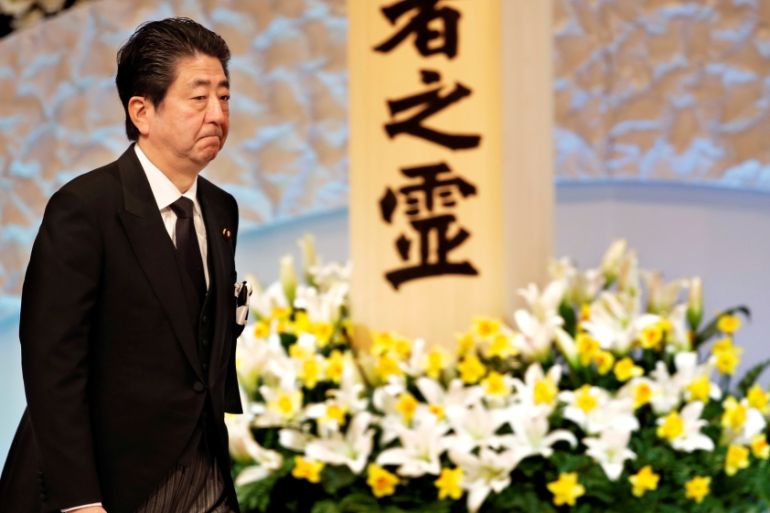Japan tsunami anniversary: PM Shinzo Abe pledges to rebuild
Prime Minister Shinzo Abe says government will continue rebuilding homes in regions still affected by 2011 disaster.

Japan has marked seven years since a devastating earthquake and tsunami levelled towns and struck a nuclear power station on the country’s east coast.
At a memorial ceremony in Tokyo on Sunday, Prime Minister Shinzo Abe and members of the imperial family honoured the roughly 16,000 people left dead as a result of the 2011 disaster.
Keep reading
list of 4 itemsHow will the Fukushima water release affect the Pacific?
Japan says brick thrown at Beijing embassy amid Fukushima spat
Japan says no radioactivity found in Fukushima fish
“When I think of the despair of those who lost beloved members of their families and friends in the disaster, I am overwhelmed even now with deep sorrow,” Abe said in his address.
Abe stated that reconstruction efforts in the northeastern region will continue, including finishing the construction of 90 percent of homes in areas affected by the earthquake and tsunami by this spring.
“Even today, more than 70,000 people are still under evacuation, with some leading uncomfortable lives for a long time,” Abe said. “There are many for whom it is still unclear when they will return to their hometowns.”
A moment of silence was observed at 2:46pm (5:46 GMT), the time that the 9.1-magnitude earthquake struck in 2011.
Radiation levels
Decontamination efforts continue in northeastern Japan years after the Fukushima Daiichi Nuclear Power Plant was damaged by the tsunami and released radioactive material into the air.
While the government has since lifted evacuation orders on several towns, about 50,000 people affected by the incident still live outside of the region for reasons that include fears for their safety, the Japan Times reported.
Some areas near the plant are designated as “difficult to return”, meaning that residents are forbidden from returning to their homes indefinitely.
A recent survey released by Greenpeace Japan estimated that the radiation levels in two towns in Fukushima were up to 100 times higher than the international limit for public exposure.
“Citizens, including children and pregnant women returning to their contaminated homes, are at risk of receiving radiation doses equivalent to one chest X-ray every week,” said radiation specialist Jan Vande Putte, who headed the study. “This is unacceptable and a clear violation of their human rights.”
The disaster initially cost the government about $199bn in financial damage, according to Japan’s Reconstruction Agency.